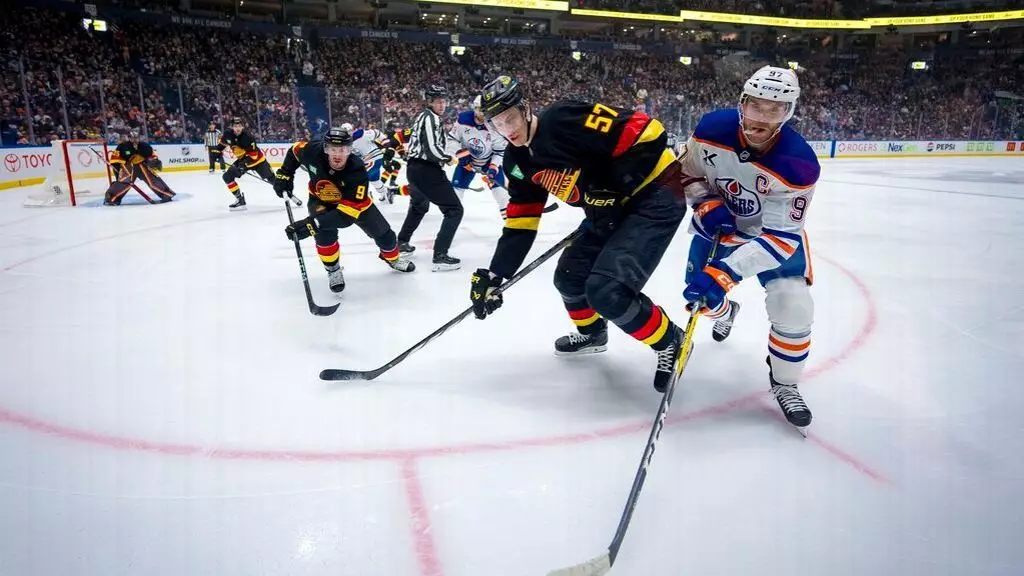The NHL landscape is often painted with the heroic feats of athletes who redefine the limits of performance and skill. Yet, it is also marred by instances of aggression and reckless behavior that can overshadow their achievements. Such incidents surfaced recently when Edmonton Oilers superstar Connor McDavid and Vancouver Canucks defenseman Tyler Myers faced three-game suspensions for delivering dangerous cross-checks during a highly contested matchup. This article delves into the implications of their actions, the league’s disciplinary framework, and the realities that the players must face as both individuals and representatives of their teams.
On a tense Saturday night, as the Oilers battled the Canucks, emotions boiled over, culminating in two significant penalties. The late-game atmosphere was fraught with intensity, especially given that the Canucks held a precarious 3-2 lead. During this high-stakes moment, McDavid, known for his esteemed skills and sportsmanship, retaliated against Vancouver’s Conor Garland with a cross-check directly to the head. The act, which stands out for a player of McDavid’s caliber, raised eyebrows and prompted immediate scrutiny from the NHL’s Department of Player Safety.
At that juncture, tensions bubbled as both teams fought for karma on the ice. After facing aggressive holding from Garland, McDavid found himself frustrated, leading to an uncharacteristic and aggressive response. Meanwhile, Myers did not escape consequences, as he, too, landed a cross-check to the head of Edmonton’s Evan Bouchard just moments after the situation escalated with McDavid. Both actions, while seemingly spontaneous, carry with them a weighty backlash in the form of suspensions that serve as a deterrent against unfiltered aggression in the sport.
The NHL’s response was swift, announcing the three-game suspensions that would sideline both players during the upcoming games. For McDavid, this marks the longest suspension of his ten-year NHL career—a history that includes multiple accolades yet few disciplinary repercussions. His check against Garland raised significant concerns, particularly because it was deemed an act of retaliation that defied the bounds of acceptable physical play.
The consequences of such actions highlight a complex dynamic where even the most talented players are susceptible to moments of frustration that lead to dangerous behaviors. The Department of Player Safety emphasized that McDavid’s conduct was not a typical effort to engage in a lawful play; rather, it was a targeted decision embroiled in the heat of the game’s intensity. Such categorizations are crucial because they signal a zero-tolerance stance for headshots—an emphasis reflecting the league’s priorities concerning player safety in an ever-evolving sport.
The penalties faced by both players erupt in a broader context of accountability within professional sports. McDavid and Myers, despite their elite statuses, fall under the same scrutiny as every player when it comes to enforcing conduct rules. Oilers coach Kris Knoblauch pointed out the uncontrollable nature of the game when superstars like McDavid are constantly under duress, often pushed to the limits by opposing players. The reaction to perceived injustices can spiral into actions that not only harm opponents but jeopardize careers through suspensions.
For McDavid, the suspension not only costs him game time but also a significant portion of his salary—over $195,000—substantially impacting his financial standings. Clearing the air, the NHL ensures that suspension earnings are redirected to the Players’ Emergency Assistance Fund, a visualization of civic responsibility within the sports community. Myers, too, faces financial losses, and beyond the immediate impacts, both players must ponder the long-term ramifications of their actions on their reputations.
Reflecting on this incident suggests a larger narrative surrounding professional player conduct. Despite being at the pinnacle of physical aptitude, McDavid and Myers found themselves caught in the whirlwind of heated competition, illustrating how fragile lines can blur between competitive spirit and reckless violence. The decision to impose suspensions, despite being harsh in nature, signals a cultural shift toward ensuring player safety, ultimately nurturing a more sustainable environment for both athletes and the sport itself.
In the wake of the suspensions, one must wonder if these incidents can serve as critical learning moments not just for McDavid and Myers, but for all NHL players navigating the often treacherous waters of professional competition. The essence of the game demands skill, passion, and discipline—attributes that must be upheld beyond mere athletic performance, calling for ethical considerations and emotional intelligence. Moving forward, these considerations will be pivotal, and both players, as well as the league, have a chance to reflect, adapt, and pave the way for safer and more respectful interaction on the ice.

